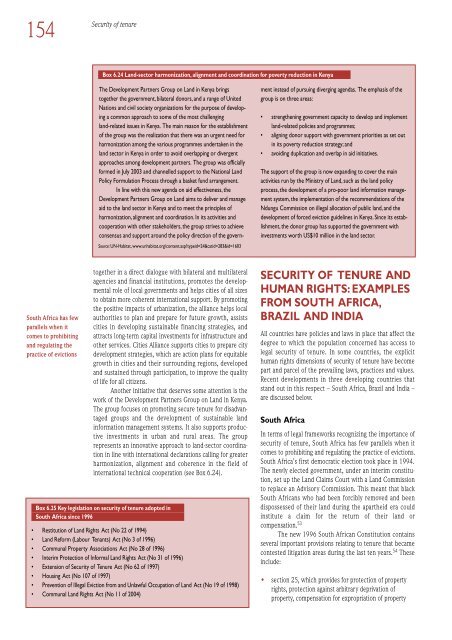Global Report on Human Settlements 2007 - PoA-ISS
Global Report on Human Settlements 2007 - PoA-ISS
Global Report on Human Settlements 2007 - PoA-ISS
Create successful ePaper yourself
Turn your PDF publications into a flip-book with our unique Google optimized e-Paper software.
154<br />
Security of tenure<br />
Box 6.24 Land-sector harm<strong>on</strong>izati<strong>on</strong>, alignment and coordinati<strong>on</strong> for poverty reducti<strong>on</strong> in Kenya<br />
Source: UN-Habitat, www.unhabitat.org/c<strong>on</strong>tent.asp?typeid=24&catid=283&id=1603<br />
The Development Partners Group <strong>on</strong> Land in Kenya brings<br />
together the government, bilateral d<strong>on</strong>ors, and a range of United<br />
Nati<strong>on</strong>s and civil society organizati<strong>on</strong>s for the purpose of developing<br />
a comm<strong>on</strong> approach to some of the most challenging<br />
land-related issues in Kenya. The main reas<strong>on</strong> for the establishment<br />
of the group was the realizati<strong>on</strong> that there was an urgent need for<br />
harm<strong>on</strong>izati<strong>on</strong> am<strong>on</strong>g the various programmes undertaken in the<br />
land sector in Kenya in order to avoid overlapping or divergent<br />
approaches am<strong>on</strong>g development partners. The group was officially<br />
formed in July 2003 and channelled support to the Nati<strong>on</strong>al Land<br />
Policy Formulati<strong>on</strong> Process through a basket fund arrangement.<br />
In line with this new agenda <strong>on</strong> aid effectiveness, the<br />
Development Partners Group <strong>on</strong> Land aims to deliver and manage<br />
aid to the land sector in Kenya and to meet the principles of<br />
harm<strong>on</strong>izati<strong>on</strong>, alignment and coordinati<strong>on</strong>. In its activities and<br />
cooperati<strong>on</strong> with other stakeholders, the group strives to achieve<br />
c<strong>on</strong>sensus and support around the policy directi<strong>on</strong> of the government<br />
instead of pursuing diverging agendas. The emphasis of the<br />
group is <strong>on</strong> three areas:<br />
• strengthening government capacity to develop and implement<br />
land-related policies and programmes;<br />
• aligning d<strong>on</strong>or support with government priorities as set out<br />
in its poverty reducti<strong>on</strong> strategy; and<br />
• avoiding duplicati<strong>on</strong> and overlap in aid initiatives.<br />
The support of the group is now expanding to cover the main<br />
activities run by the Ministry of Land, such as the land policy<br />
process, the development of a pro-poor land informati<strong>on</strong> management<br />
system, the implementati<strong>on</strong> of the recommendati<strong>on</strong>s of the<br />
Ndungu Commissi<strong>on</strong> <strong>on</strong> illegal allocati<strong>on</strong> of public land, and the<br />
development of forced evicti<strong>on</strong> guidelines in Kenya. Since its establishment,<br />
the d<strong>on</strong>or group has supported the government with<br />
investments worth US$10 milli<strong>on</strong> in the land sector.<br />
South Africa has few<br />
parallels when it<br />
comes to prohibiting<br />
and regulating the<br />
practice of evicti<strong>on</strong>s<br />
together in a direct dialogue with bilateral and multilateral<br />
agencies and financial instituti<strong>on</strong>s, promotes the developmental<br />
role of local governments and helps cities of all sizes<br />
to obtain more coherent internati<strong>on</strong>al support. By promoting<br />
the positive impacts of urbanizati<strong>on</strong>, the alliance helps local<br />
authorities to plan and prepare for future growth, assists<br />
cities in developing sustainable financing strategies, and<br />
attracts l<strong>on</strong>g-term capital investments for infrastructure and<br />
other services. Cities Alliance supports cities to prepare city<br />
development strategies, which are acti<strong>on</strong> plans for equitable<br />
growth in cities and their surrounding regi<strong>on</strong>s, developed<br />
and sustained through participati<strong>on</strong>, to improve the quality<br />
of life for all citizens.<br />
Another initiative that deserves some attenti<strong>on</strong> is the<br />
work of the Development Partners Group <strong>on</strong> Land in Kenya.<br />
The group focuses <strong>on</strong> promoting secure tenure for disadvantaged<br />
groups and the development of sustainable land<br />
informati<strong>on</strong> management systems. It also supports productive<br />
investments in urban and rural areas. The group<br />
represents an innovative approach to land-sector coordinati<strong>on</strong><br />
in line with internati<strong>on</strong>al declarati<strong>on</strong>s calling for greater<br />
harm<strong>on</strong>izati<strong>on</strong>, alignment and coherence in the field of<br />
internati<strong>on</strong>al technical cooperati<strong>on</strong> (see Box 6.24).<br />
Box 6.25 Key legislati<strong>on</strong> <strong>on</strong> security of tenure adopted in<br />
South Africa since 1996<br />
• Restituti<strong>on</strong> of Land Rights Act (No 22 of 1994)<br />
• Land Reform (Labour Tenants) Act (No 3 of 1996)<br />
• Communal Property Associati<strong>on</strong>s Act (No 28 of 1996)<br />
• Interim Protecti<strong>on</strong> of Informal Land Rights Act (No 31 of 1996)<br />
• Extensi<strong>on</strong> of Security of Tenure Act (No 62 of 1997)<br />
• Housing Act (No 107 of 1997)<br />
• Preventi<strong>on</strong> of Illegal Evicti<strong>on</strong> from and Unlawful Occupati<strong>on</strong> of Land Act (No 19 of 1998)<br />
• Communal Land Rights Act (No 11 of 2004)<br />
SECURITY OF TENURE AND<br />
HUMAN RIGHTS: EXAMPLES<br />
FROM SOUTH AFRICA,<br />
BRAZIL AND INDIA<br />
All countries have policies and laws in place that affect the<br />
degree to which the populati<strong>on</strong> c<strong>on</strong>cerned has access to<br />
legal security of tenure. In some countries, the explicit<br />
human rights dimensi<strong>on</strong>s of security of tenure have become<br />
part and parcel of the prevailing laws, practices and values.<br />
Recent developments in three developing countries that<br />
stand out in this respect – South Africa, Brazil and India –<br />
are discussed below.<br />
South Africa<br />
In terms of legal frameworks recognizing the importance of<br />
security of tenure, South Africa has few parallels when it<br />
comes to prohibiting and regulating the practice of evicti<strong>on</strong>s.<br />
South Africa’s first democratic electi<strong>on</strong> took place in 1994.<br />
The newly elected government, under an interim c<strong>on</strong>stituti<strong>on</strong>,<br />
set up the Land Claims Court with a Land Commissi<strong>on</strong><br />
to replace an Advisory Commissi<strong>on</strong>. This meant that black<br />
South Africans who had been forcibly removed and been<br />
dispossessed of their land during the apartheid era could<br />
institute a claim for the return of their land or<br />
compensati<strong>on</strong>. 53<br />
The new 1996 South African C<strong>on</strong>stituti<strong>on</strong> c<strong>on</strong>tains<br />
several important provisi<strong>on</strong>s relating to tenure that became<br />
c<strong>on</strong>tested litigati<strong>on</strong> areas during the last ten years. 54 These<br />
include:<br />
• secti<strong>on</strong> 25, which provides for protecti<strong>on</strong> of property<br />
rights, protecti<strong>on</strong> against arbitrary deprivati<strong>on</strong> of<br />
property, compensati<strong>on</strong> for expropriati<strong>on</strong> of property

















